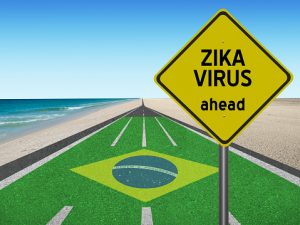 Zika virus and new super bacteria pose a threat to athletes at the approaching Olympic Games in Rio de Janeiro, Brazil. Researchers are monitoring the potential Zika virus exposure risk among Olympic athletes, coaches, and other U.S. Olympic Committee (USOC) members attending the 2016 Summer Olympics.
Zika virus and new super bacteria pose a threat to athletes at the approaching Olympic Games in Rio de Janeiro, Brazil. Researchers are monitoring the potential Zika virus exposure risk among Olympic athletes, coaches, and other U.S. Olympic Committee (USOC) members attending the 2016 Summer Olympics.
Catherine Y. Spong, director of National Institute of Child Health and Human Development (NICHD), said, “Zika virus infection poses many unknown risks, especially to those of reproductive age. Monitoring the health and reproductive outcomes of members of the U.S. Olympic team offers a unique opportunity to answer important questions and help address an ongoing public health emergency.”
Advertisement
Research lead Carrie L. Byington, M.D., added, “We partnered with the USOC to improve knowledge of the dynamics of Zika infection, so that we can better protect the health of athletes and staff who will participate in the 2016 Games. This ongoing relationship also opens avenues for long-term research that promises to benefit not only the Americas, but also other regions facing the emergence of the virus.”
The aim of the study is to track Zika virus incidences, identify potential risk factors for infection, detect where the virus exists in the body (semen, blood, etc.), evaluate how long the virus stays in the body for, and to discover the reproductive outcomes of those affected by Zika virus within a year.
Participants in the current study will all complete health surveys and provide samples of bodily fluids. Because Zika virus is often asymptomatic in adults, regular samples must be obtained from bodily fluids to track the illness. Zika virus testing kits and training on using these tests will be provided by the U.S. Centers for Disease Control and Prevention.
All staff members, athletes, and coaches will be briefed on the Zika outbreak and provided necessary information to address all possible questions regarding Zika virus.
Approximately 3,000 USOC staff members are expected to travel to Brazil. In addition, spouses or sexual partners who are traveling to Brazil may be eligible to participate in this study.
The Games will take place in Rio de Janeiro from August 5 to 21, 2016, and the Paralympic Games are scheduled for September 7 to 18, 2016.
Study finds super bacteria in Rio’s waters in the wake of the Olympics
As if Zika virus threat is not enough to put a damper on the approaching Olympics in Rio, a drug-resistant super bacteria has recently been detected in the waters near Rio de Janeiro’s beaches by the Brazilian scientists. Lead researcher Renata Picao explained the “super bacteria” entered the city’s waterways when sewage coming from local hospitals got channeled into the bay.
“We have been looking for ‘super bacteria’ in coastal waters during a one-year period in five beaches. We found that the threats occur in coastal waters in a variety of concentrations and that they are strongly associated with pollution,” explained Picao.
The superbug found was carbapenem-resistant Enterobacteriaceae (CRE).
The next step is to determine the impact of these super bacteria on humans.
The news comes at a busy time when hundreds of athletes, coaches, and support staff are getting ready to flood Brazil for the 2016 Olympic Games. So far, Brazil has been plagued with a Zika virus outbreak, causing some athletes to pull out of the worldwide spectacle. Now this new discovery may have other athletes cancelling their flights as well.
Tips for travelers to protect themselves from Zika virus
Whether you are a spectator, athlete, coach, or tourist, if you’re heading to Brazil this summer, there are important tips you need to keep in mind. The following recommendations have been compiled by the Centers of Disease Control and Prevention (CDC).
- Schedule a doctor’s appointment four to six weeks prior to departure and discuss any vaccines that may help you or that are required when travelling to Brazil.
- Purchase travel medical insurance and medical evacuation insurance.
- Pack a travel health kit.
- Monitor travel alerts and warnings.
- Keep copies of your itinerary, credit cards, and passports with someone at home.
- During your trip, follow security guidelines – avoid travelling at night or alone, drink alcohol in moderation, keep a photocopy of your passport, follow local laws and customs, avoid wearing expensive jewelry and clothing, keep hotel doors locked.
- Follow food and water safety guidelines.
- Prevent mosquito bites by wearing long clothing, using insect repellent, avoiding still water, etc.
- Follow hot climate guidelines.
- Avoid swimming in fresh water, lakes, and rivers.
- Choose safe transportation.
- Wash your hands often.
By following these guidelines, not only can you lower your risk of Zika virus, but also protect your overall health and safety.
Related Reading:
Zika virus outbreak 2016, mosquito bites, insecticides, and more
The Zika virus is spread through mosquito bites, and insecticides can help reduce your risk of getting bitten. The Zika virus originated in Brazil and is quickly becoming a global problem with many countries now being labeled as dangerous for travel, especially for pregnant women. Continue reading…
Advertisement
Experts predict Zika will travel to southern U.S.
Experts predict that Zika – a mosquito-borne virus – will travel to the Southern U.S. Although experts are not sure when the virus may spread, they are certain that it is only a matter of time that the birth-defect illness will make its way into America. Continue reading…
Sources:
https://www.nih.gov/news-events/news-releases/nih-funds-zika-virus-study-involving-us-olympic-team
http://edition.cnn.com/2016/07/05/americas/rio-de-janeiro-super-bacteria/
http://wwwnc.cdc.gov/travel/notices/alert/2016-summer-olympics-rio
